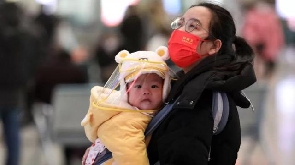Di population of China don fall for di first time inside sixty years, wit di national birth rate wey reach di record lowest of - 6.77 births per 1,000 pipo.
Di population for 2022 – wey be 1.4118 billion - fall by 850,000 from 2021.
Di way pipo dey born pikin for China don dey reduce for years, dis don make dem to tink about policies to try to slow di trend.
But seven years afta dem stop di one-child policy, e don enter di era of wetin one official describe as an "era of negative population growth".
Di birth rate for 2022 also come down from 7.52 for 2021, according to China National Bureau of Statistics, wey release di figures on Tuesday.
To compare, for 2021, di United States record 11.06 births per 1,000 pipo, and di United Kingdom, 10.08 births.
Di birth rate for di same year for India, wey go soon overtake China as di world most populous kontri, na 16.42.
Di number of pipo wey die also plenti pass di number of new pikin dem for di first time last year for China.
Dem record dia highest death rate since 1976 – and na 7.37 deaths per 1,000 pipo, up from 7.18 di previous year.
Earlier, goment data bin dey hype demographic crisis, wey go reduce di work force for China in future and increase di burden on healthcare and oda social security costs.
Results from one once-a-decade census wey dem announce for 2021 show say China population dey grow wit slow motion, and na di slowest for many years.
Populations dey also reduce and old age for oda East Asian kontris like Japan and South Korea.
"Dis trend go continue and e fit worse afta Covid," Yue Su, wey be principal economist for di Economist Intelligence Unit tok.
Ms Su dey among experts wey expect China population to continue to reduce for 2023.
"Di high youth unemployment rate and weaknesses in income expectations fit delay marriage and childbirth plans di more, wey go also bring down di number of newborns," she add.
And di death rate for 2023 fit dey higher dan di pre-pandemic sake of Covid infections, she tok.
Covid cases for China increase well well since dem stop dia zero-Covid policy last month.
Di population of China dey shaped over di years by di controversial one-child policy, wey dem introduce for 1979 to slow population growth.
Families wey break di rules pay fine, and for some cases, dem lose dia jobs. For culture wey dey favour boys more dan girls according to history, di policy don also make pipo dey do by force abortions and gender ration wey bend go one side from di 1980s.
Dem scrap di policy for 2016 and married couples fit born two to three children. In recent years, di Chinese goment also give tax breaks and beta maternal healthcare, plus oda benefits , to reverse, or at least slow, di falling birth rate.
But all dis policies no lead to a sustained increase in births. Some experts say na becos policies wey encourage childbirth no dey accompanied by efforts to reduce di burden of childcare, such as more help for working mothers or access to education.
For October 2022, Chinese President Xi Jinping make boosting birth rates priority. Oga Xi bin tok say in a once-in-five-year Communist Party Congress for Beijing say im goment go "pursue a proactive national strategy" to respond to di ageing population for di kontri.
Apart from di benefits wey dem dey give di pikin dem, make China also improve gender equality for households and workplaces, Bussarawa tok.
Teerawichitchainan, director of di National University of Singapore Centre for Family and Population Research.
Scandinavian kontris don show say such moves fit improve fertility rates, she add.
According to Paul Cheung, Singapore former chief statistician, China get "plenty manpower" and "a lot of lead time" to manage di demographic challenge.
"Dem no dey for urgent situation right now," im tok.
Observers also tok say to raise birth rates no go resolve di problems wey dey behind di slow growth for China.
"Boosting fertility no go improve productivity or increase domestic consumption for di medium term," na wetin Stuart Gietel-Basten, wey be public policy professor for The Hong Kong University of Science and Technology.
"How China go respond to dis structural issues go dey more crucial."
BBC Pidgin of Tuesday, 17 January 2023
Source: BBC
















